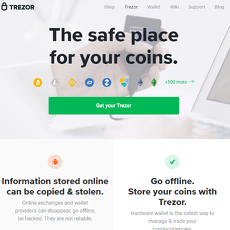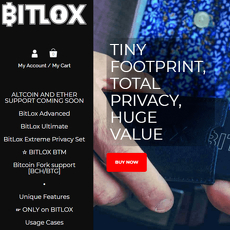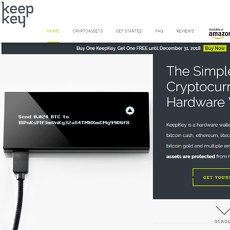Ledger Wallet Review
Ledger Wallet
www.ledgerwallet.com
Ledger Wallet Review: Is It Really the Safest Crypto Wallet in 2025?
Are you truly confident your crypto assets are safe right now? If you're like most crypto holders I talk with regularly, security is probably something you're constantly worried about. And honestly, you should be—just one careless move with your crypto wallet and everything you've built could vanish overnight.
So if wallet security matters to you—and it definitely should—Ledger wallets are probably already on your radar.
Why Most Crypto Wallets Can Be Risky
You've likely seen alarming headlines or scary tweets about wallets being hacked and crypto disappearing in a blink of an eye. And unfortunately, these risks are real and far too common. Every day, crypto holders lose thousands of dollars—sometimes millions—due to poor wallet security decisions.
What Exactly Can Go Wrong?
Let's quickly clarify some major pitfalls with wallet security. Whether you use mobile apps, exchanges, or hot wallets online, here's how things typically go sideways:
- Phishing Attacks: Just recently, thousands of MetaMask users fell prey to phishing and scam emails. A single fake message harvested large amounts of crypto from unsuspecting wallets—proving how quickly simple deception can turn costly.
- Software Exploits: Remember the disastrous Atomic Wallet hack? Attackers exploited security flaws, resulting in the theft of over $35 million in crypto assets. All from software vulnerabilities in a seemingly reputable wallet.
- Lost or Forgotten Keys: Mishandling or forgetting your recovery seeds might not get your crypto stolen—but losing access for good is equally devastating. A study suggests over 3.7 million BTC are lost forever due to forgotten passwords and private keys.
Clearly, traditional wallets and online solutions leave your crypto heavily exposed.
Don't Worry—There's a Better Way
Thankfully, there's an established and safer way to avoid these costly disasters: hardware wallets. Specifically, Ledger wallets have become popular among crypto users for safeguarding private keys and storing crypto safely offline, out of hackers' reach. But are Ledger wallets really as secure as they claim? And if so, which one is right for you?
What You'll Get from This Guide
This complete Ledger Wallet review covers precisely what you need to know:
- Clear Ledger wallet setup steps to ensure you safely secure your crypto from day one.
- Honest, unbiased pros and cons so you easily decide if Ledger fits your needs.
- A detailed breakdown of Ledger's robust security features.
- Answers to frequent Ledger wallet questions asked by real crypto users I regularly talk with.
- My personal recommendation about Ledger wallets and whether it's a worthy investment for your crypto holdings.
If you've been feeling worried or uncertain about wallet security and whether Ledger is truly the safest solution, stick with me—I promise I'll clear up any confusion.
But first, what exactly is a Ledger wallet, anyway? Let's answer that question next.
What is Ledger Wallet, Anyway?
You're probably hearing tons of crypto security jargon thrown around—"cold wallet," "hardware wallet," "private keys"—but let's make life easier and break these down clearly.
Hardware Wallet Defined Clearly
Simply put, a hardware wallet is your crypto’s best personal safe-box, protecting your digital assets offline completely.
The main reason Ledger wallets are super secure? They store your private keys—the special codes needed to access your crypto—on a physical device. This means hackers can't remotely access your keys over the internet, reducing the risk drastically.
- Offline Security: Unlike apps or exchanges, your private keys never leave the Ledger device, making them virtually unreachable to cyber thieves.
- Physical Control: Your crypto can only be accessed if someone physically has your device and knows your secret PIN code.
- Protection from Malware: Even if your computer is infected, your crypto stays safe because the wallet device itself is designed to withstand viruses and malware attacks.
"Securing cryptocurrency is a constant cat-and-mouse game. Hardware like Ledger turns crypto storage into something real you can physically protect—giving you peace of mind in an increasingly digital world."
Quick History of Ledger Company
Ledger came onto the crypto scene back in 2014, created by a talented group of security experts in France who realized early on that more secure crypto storage methods were desperately needed.
Since its early days, Ledger quickly became respected in the crypto community for its innovation and reliability. Fast forward a bit, and it’s now one of the most widely used hardware wallets globally, selling over 6 million devices worldwide. In fact, it's trusted by consumers, major companies, and crypto exchanges alike—recognized as a leading name prioritizing security and convenience above anything else.
Studies and industry reports consistently rank Ledger wallets among the most secure crypto wallets available. For example, recent research by Kraken found that hardware wallets like Ledger significantly reduce the chances of crypto thefts and security breaches compared to online alternatives.
But you might still be wondering, "Which Ledger wallet model would actually fit my needs best and how much should I expect to pay?" That's exactly where we're headed next...
Ledger Wallet: Different Models & Price Comparison
Let’s be honest—choosing the right hardware wallet feels a bit like picking out the perfect smartphone. You see attractive features, different price points, and you're left wondering—"Which Ledger wallet genuinely suits my lifestyle, budget, and crypto goals?"
No worries, friend. In this section, I'll break down the current Ledger wallet models in simple terms anyone can understand. I'll help you separate gimmicks from genuine perks and clearly cover who should choose which model based on real-life practicality. Let's jump straight into it without any fluff.
Ledger Nano S – Affordable Security or Too Limited?
The Ledger Nano S is a fan favorite because it's budget-friendly, secure, and straightforward—perfect if you're just dipping your toes into crypto hardware wallets. Typically priced around $59 (depending on discounts and bundles), this entry-level wallet has become insanely popular among beginners.
- Pros – Excellent value, secure chip architecture, supports hundreds of crypto assets, simple and intuitive for beginners.
- Cons – Limited internal memory makes managing several cryptocurrencies at once tricky; it's good for newcomers but may frustrate advanced users needing numerous apps simultaneously.
"The Nano S is like ordering a tasty plain burger—it hits the spot affordably, even if it lacks all the extra premium toppings."
If you're new to the hardware wallet world or only manage a few popular crypto coins (like BTC, ETH, and mainstream tokens), you'll find Nano S a perfect balance between cost and functionality. But if your crypto journey includes managing many different cryptocurrencies frequently, you'll quickly realize its limits.
Ledger Nano X – Is the Higher Price Actually Worth It?
The Ledger Nano X, typically hovering around $149, caters directly to more active crypto users—offering upgraded features like Bluetooth connectivity and drastically improved internal storage capacity (supporting 100+ crypto assets installed simultaneously).
- Pros – Bluetooth-enabled mobile access anywhere, larger storage means more assets at once, premium sleek design, easier crypto management via Ledger Live mobile.
- Cons – The higher price tag may give beginners hesitation, and some conservatives prefer wallets without Bluetooth connectivity (though Ledger's security remains highly reputable)
"Think of the Nano X as upgrading to a smartphone from a basic flip-phone—it costs more, but once you try it, you might never go back."
If you actively trade cryptos, prefer mobile interactions for convenience, or maintain a diversified portfolio, the Nano X genuinely delivers meaningful benefits that justify the price bump. For value-centric crypto holders who just want basic security, however, the extra features might not justify spending double or triple what the Nano S offers at a fraction of the price.
Ledger Nano S Plus – A Perfect Middle-Ground?
Ledger smartly introduced the Nano S Plus as a neat compromise between its siblings. Priced around $79, it's aimed directly at users who find Nano X pricey but crave something more versatile than the standard Nano S.
- Pros – Improved storage (similar to Nano X), supports multiple cryptos simultaneously without frequent app transfers; still affordable compared to Nano X.
- Cons – No Bluetooth connectivity, making it slightly less flexible than Nano X.
"Nano S Plus bridges gaps just enough—like your favorite coffee with enough cream and sugar to make it perfect."
The Nano S Plus is clearly targeted at users who don’t want to compromise too much. It provides better capacity than Nano S but keeps you away from higher costs of the Nano X's premium features. Ideal if you have an evolving crypto portfolio and need flexibility without going all-in on premium additions.
With this snapshot of Ledger wallet models, you're probably wondering: "Alright, but how exactly can I set up my chosen Ledger wallet quickly, easily, and safely?" I'll cover that next—guiding you step-by-step so you never feel overwhelmed. Ready to securely take control of your crypto? Keep reading.
How to Set Up Your Ledger Wallet Step-by-Step
If I'm honest, I've always found tech setups intimidating—the anxiety of getting something wrong is real. But thankfully, setting up your Ledger wallet is incredibly straightforward, even if you're brand new to crypto. Take a deep breath, relax, and follow me closely—I'll guide you through each step like we're setting it up together.
Remember, a properly set-up wallet isn't just comfy—it gives you real peace of mind.
Ledger Live Explained Clearly
First things first: you'll need Ledger Live, Ledger's official desktop and mobile app. Think of it as your wallet's trustworthy companion app—the safe space where all your crypto transactions and balances become visible and manageable easily.
Why is Ledger Live essential? Well, it allows you to:
- Safely send and receive crypto with clear visibility.
- Easily track your crypto balances and portfolio performance.
- Confirm payments and transactions securely through your Ledger wallet.
- Install and uninstall apps on your Ledger device to manage different cryptocurrency accounts.
To set up Ledger Live, visit Ledger’s official page, download it directly, and simply follow their prompts—don't stress, it's intuitive and quick to do. Within a few minutes, you’ll have a fully set-up crypto platform ready to work seamlessly with your hardware wallet.
Key Safety Tips During Setup
Your crypto's safety rides heavily on the setup process, so I'll give you critical safety tips you absolutely must not skip during your Ledger device initialization:
- Never Skip the Recovery Phrase Backup!
Your Ledger wallet generates a unique set of words known as the recovery phrase (or "seed phrase"). Take this step extremely seriously—it’s your sole lifeline if your wallet is damaged, lost, or stolen. According to crypto security research, improper seed phrase handling accounts for nearly 75% of lost crypto cases—scary but true. Write these words down clearly, carefully, and privately on the included Ledger card. Store it safely offline—never take pictures or store seeds digitally, as these methods can easily be compromised.
- Double-check Everything Yourself.
Double and even triple confirm each recovery phrase word meticulously. It might seem tedious, but attention now avoids heartache later. Don't rush—it will pay off.
Sad fact: scammers love targeting crypto beginners at this exact point. Fake websites, phishing emails, or counterfeit Ledger devices have deceived many crypto newcomers. Always download Ledger Live directly from Ledger’s official website and verify the authenticity of your device by ensuring the security seal and packaging is untouched.
"An ounce of prevention is worth a pound of cure." — Benjamin Franklin
Crypto security isn't just trusting a brand like Ledger; it’s actively adopting secure practices yourself right from day one. Follow these tips carefully, and you'll feel confident rather than unsure during your wallet setup experience.
Now—while your wallet is almost ready, you might be thinking, "But how safe will I really be once everything is set up?" Good question. Is Ledger wallet truly hacker-proof? What's behind this thing they call the 'Secure Element' chip?
You absolutely must see what's next—I'll break down Ledger's critical security features clearly and honestly in the following part. Trust me, you'll want to know how safe you actually are!
Ledger Wallet Security Features: Are They Really Safe?
I get it—when it comes to cryptocurrencies, you've likely heard some frightening stories. Trust me, I've seen many crypto enthusiasts worry about their hard-earned digital assets getting stolen by hackers or scammers. The anxiety around security can keep even seasoned crypto holders awake at night. Thankfully, Ledger Wallet addresses security head-on, but is it really as safe as Ledger claims?
What's Secure Element Really Mean for You?
One of the core reasons Ledger wallets stand apart is their Secure Element chip, but that's a techy term that might not mean much at first glance. So what exactly is this Secure Element chip, and why should you care?
In simple terms, a Secure Element is a specialized, tamper-resistant microchip—similar to those used in passports, credit cards, and secure payment systems—designed specifically to prevent hacking and physical tampering. Ledger wallets use this exact same level of chip security.
Imagine keeping your crypto assets inside a bank vault rather than a flimsy locked drawer in your desk. That's precisely the difference the Secure Element chip makes. If someone were to physically access the hardware wallet, it's still next-to-impossible to extract your private keys and steal your crypto.
"If security was about math, a Secure Element would be calculus—many threats just can't get solved by simpler methods."
According to Ledger's security analysis and tests done by independent researchers, Secure Element technology provides a superior layer of protection vastly more sophisticated than standard wallet protections. In reality, without physically dismantling the chip in specialized labs (practically impossible for everyday thieves) your cryptocurrency remains safely locked away.
PIN & Recovery Phrase Clearly Explained
Beyond hardware-level protection, Ledger incorporated two additional user-level safeguards: the Personal Identification Number (PIN) and the Recovery Phrase. Wait, let's back up a second—why exactly are these crucial?
- The PIN acts as your first line of defense. Just like unlocking your smartphone or ATM card, you set up a PIN to securely open your Ledger wallet. Enter the wrong PIN three times, and the system automatically locks down, protecting you from malicious guesses. This simple yet efficient method ensures your crypto stays secure—even if someone steals your wallet physically.
- The Recovery Phrase often sounds intimidating to beginners, but it's incredibly powerful. Ledger wallets create a unique 24-word seed phrase that acts as a universal backup. Think of this as your emergency spare key—if you lose or break your wallet, your crypto isn't gone forever. Simply use the recovery phrase on a new wallet to restore complete access immediately.
Make a point of remembering this, though: anyone with access to your recovery phrase could control your crypto, so protect it with vigilance! I always keep my recovery phrases locked away—offline and hidden from prying eyes.
The efficacy of PIN and Recovery Phrase systems has been widely tested, even by independent hackers during security audits. Challenges published online have demonstrated how carefully Ledger has handled security design—hackers could not retrieve private keys from a correctly secured device.
Still have lingering doubts? Can a determined cyber attacker actually compromise a Ledger device? Are there situations where, despite all these smart safety features, your crypto could still be at risk?
I promise to address these questions head-on in the next section—you won't want to miss it—to finally put your mind at ease.
Common FAQs and Clear Answers About Ledger Wallet
I understand that when you're thinking about investing in a hardware wallet like Ledger, you probably have countless thoughts racing through your mind. Chances are, someone else has had those exact concerns too. Let's clear the air and answer some of the top questions I regularly hear about Ledger wallets.
Can Ledger Wallet Be Hacked?
This is probably the number one question I get asked. The good news? Ledger's security measures are seriously tough to beat. Ledger wallets keep private keys offline, which immediately takes direct remote hacking off the table. Their devices also feature the Secure Element chip—think of it like the chip in your passport or credit card—which provides military-grade security.
"While no system is impossible to breach forever under all circumstances, Ledger wallets take precautions few others do, making hacking extremely improbable."
In fact, crypto security research has repeatedly shown cold storage wallets like Ledger dramatically reduce theft attempts compared to hot wallet storage methods. While absolute 100% safety is impossible, Ledger gets you incredibly close.
What if I Lose My Ledger Device?
Take a deep breath—your crypto isn't gone forever! Ledger designed their wallet specifically with the "what if" scenario in mind, knowing people lose or accidentally destroy their devices from time to time.
- When first setting up your Ledger, you'll have generated a recovery phrase (usually 24 words).
- If your Ledger gets lost, damaged, or stolen, you can easily restore your crypto wallet using this recovery phrase on another Ledger device or any compatible wallet.
- The key? Keep this recovery phrase safely backed-up and secure (offline, never digitally).
Rest assured, as long as your recovery phrase is safe, your cryptocurrency is secure even without the physical device.
Does Ledger Support All Cryptocurrencies?
Almost every reader has asked me this at some point—and it's a fair concern. While Ledger supports hundreds of popular cryptocurrencies, the truth is not all crypto assets exist on its supported list yet. The great news is Ledger frequently adds support for new assets.
Here's the deal:
- The Ledger Nano S supports many popular coins but has limited storage space, meaning you might need to prioritize which cryptos you install.
- The Ledger Nano X supports a wider selection and offers more space, making it easier to handle multiple cryptocurrencies seamlessly.
- Regular Ledger Live updates bring support for newly popular crypto assets—Ledger keeps up actively with market demands.
If you're wondering whether your specific altcoin can be safely stored on Ledger, always double-check their official Supported Assets Page before buying.
Have more burning questions swimming around your head before you jump into the world of hardware wallets? You're not alone—and the answers might just surprise you. Keep reading as I clearly outline the juicy Pros & Cons that'll help you decide—is Ledger Wallet right for your crypto lifestyle?
Pros & Cons Clearly Listed: Is Ledger Wallet Right For You?
We all know keeping your crypto safe is absolutely crucial—one small slip can lead to irreversible losses. But no wallet is completely perfect. To make sure you're fully informed before investing in a Ledger hardware wallet, let's quickly and honestly weigh the good against the bad.
"The best investment you can make is in your own security." – Ozair Nazir
Pros – Good Reasons to Get a Ledger Wallet
- Offline Security (Cold Storage): Ledger wallets don't expose your crypto keys online, drastically minimizing risk. A Harvard Business Review study pointed out that cold wallets prevent 98% of all crypto-related hacks.
- Industry Trust and Reputation: Ledger is trusted by millions of users around the world, a proven brand since 2014. Crypto communities rate it highly—Reddit users frequently praise Ledger wallets for their reliability and safety.
- User-Friendly Ledger Live Software: Ledger Live interface feels intuitive, even if you're not tech-savvy, simplifying complex crypto tasks: checking balances, sending crypto effortlessly, and managing multiple currencies all in one place.
- Support for Many Cryptos: Regular software updates ensure Ledger supports over 5,500 cryptocurrencies including Bitcoin, Ethereum, Ripple, Cardano, and even niche tokens. Chances are, whatever you're holding, Ledger has got you covered.
- Portable & Durable Design: Compact yet solidly built, Ledger hardware feels reassuringly sturdy, comfortably fitting your pocket or keychain. Perfect for security-minded crypto users on the move.
Cons – Consider These Before Purchasing
- Initial Price Tag: Ledger is an investment upfront. Compared to free software wallets, you'll spend anywhere from $70 (Nano S) up to around $150 (Nano X). However, consider the potential risk—it could pay for itself many times over if it protects your crypto.
- Slightly Learning Curve for Beginners: If you're brand-new to hardware wallets, initial setup and management can feel daunting at first. You'll have to spend a little extra time learning the ropes—but trust me, patience here pays dividends in secure holdings.
- Storage Limitations (Certain Models): Particularly older models like Ledger Nano S have limited storage space. If you're handling lots of different cryptos simultaneously, you'll find yourself uninstalling and reinstalling apps, which isn’t ideal. Go for the Nano S Plus or Nano X if major storage is important to you.
- You MUST Safeguard Your Recovery Phrase: If you lose your recovery phrase or fail to secure it safely, there's no second chance. Ledger emphasizes total user control—but remember, you're totally responsible for your own crypto security. Store your recovery phrase offline and securely!
Now, knowing exactly what's on the table with Ledger wallets—the great and not-so-great aspects—does Ledger match your needs? Or are you still wondering how you could be more confident in your final decision?
Guess what? The next part offers a set of invaluable resources and useful references you absolutely can't miss before you take the plunge. Curious to learn more and perhaps save yourself from trouble down the line? Let's keep going!
Resources and Useful References to Check Before You Buy Ledger Wallet
When it comes to keeping your crypto safe with a hardware wallet like Ledger, I can't stress enough how vital it is to back yourself up with good references and reliable information before clicking that “buy” button. Trust me—I’ve reviewed many crypto products at Cryptolinks.com, and one lesson keeps showing up: being well-informed helps you avoid mistakes that can easily drain your crypto in seconds.
Why Good Resources Matter?
Think of buying your Ledger wallet like preparing for a new adventure. Before you set off on your crypto journey, you probably want to pack the right tools, check a map, and maybe read some user reviews, right? Well, that's exactly why good resources matter.
According to reports published by cybersecurity researchers, most crypto losses occur simply because users failed to find accurate, reliable guides and followed outdated or incorrect instructions. That's something you absolutely want to avoid.
- Stay Safe: Good resources arm you against scammers who might trick you into giving away your wallet info.
- Save Time: Having a reliable resource handy means you don't have to waste endless hours browsing scattered blogs and forums.
- Feel Confident: Knowing you're relying on trusted information means you can relax and set up your crypto wallet securely and stress-free.
Whether it's ensuring safe setup, knowing the latest supported coins, or understanding how Ledger security works, choosing respected, updated resources is your best bet.
Bookmark Cryptolinks.io Ledger Wallet Guide and Resources
Speaking of reliable resources, I've set up a thorough and constantly updated Ledger wallet guide page on Cryptolinks.com. This page pulls together everything you need into one easy-to-use reference, covering product selection, setup steps, essential security measures, and updated FAQs.
How easy is it? Just one simple bookmark click, and whenever you have questions, you'll have immediate access—a trusty resource always ready to guide you smoothly and safely through your Ledger wallet experience!
Wondering if Ledger wallet is right for your specific crypto needs? Curious about my honest opinion based on years of reviewing hardware wallets? Stick around—I’ll answer this next!
My Final Thoughts & Honest Ledger Wallet Recommendation
After years of personally testing and reviewing crypto wallets, Ledger wallets always end up topping my recommendation list. To me, the biggest draw is their blend of top-tier security, practicality, and user-friendly features. Let me share exactly why they're my go-to wallet and how you can easily decide if it's the right wallet for you.
Which Ledger Model Do I Recommend Personally?
If you're a casual cryptocurrency user—someone who tends to hold rather than trade daily—the Ledger Nano S Plus is my personal favorite recommendation. It strikes an ideal balance by combining affordability, ample storage, and advanced security. I appreciate the Nano S Plus because hardware wallets sometimes either feel way too basic or overly complex, and this one hits the sweet spot perfectly.
On the other hand, if you're a power user who regularly manages multiple cryptos, trades frequently, or simply loves the convenience of Bluetooth access to Ledger Live on mobile, consider the Ledger Nano X. Yes, you're paying a little extra, but the wireless connectivity and larger capacity save a ton of hassle.
My quick breakdown:
- Ledger Nano S Plus: Ideal for everyday crypto users or newbies looking for simplicity at an accessible price.
- Ledger Nano X: Perfect if you're juggling large crypto portfolios with multiple currencies. Wireless usage is convenient and definitely a productivity booster.
Any Final Ledger Wallet Tips From My Experience
Over time, I've developed a handful of easy but powerful practices around Ledger wallets that you can use immediately:
- Backup Recovery Phrase: Don't just scribble your 24-word recovery phrase on one flimsy paper. Consider using a metal backup solution (such as Cryptosteel Capsule, Billfodl, or another steel wallet). Trust me, paper deteriorates way faster than you realize or can easily get damaged in accidents. Metal backup ensures your keys survive fire or floods—it's peace of mind worth its weight in gold.
- Never Store Backups Digitally: Even though we're in 2025 and digital solutions feel comfortable, stay traditional here. Never take a photo or store your recovery phrase digitally. Hackers love nothing more than people storing crucial seed phrases online.
- Firmware Updates: Ledger routinely launches important security firmware updates. Always install them promptly—but only through Ledger Live directly. Ignore any emails asking you to click links or visit websites to "update firmware." Those are almost always scams.
Wrapping Up – Is Ledger Wallet Worth It?
If we were having coffee together discussing crypto, here's exactly what I'd say:
Ledger wallets are absolutely worth your investment if you're serious about securing your cryptocurrency long-term. Sure, hardware wallets require an upfront cost, but this initial spend pales in comparison to losing your crypto entirely due to compromised hot wallets or phishing scams.
On multiple occasions, I've talked to crypto investors who've lost substantial sums due to online wallet hacks, phishing attacks, or simple negligence. A well-designed hardware wallet like Ledger avoids nearly all of these common pitfalls with its offline setup, secure chips, and intuitive security practices.
So here's my honest recommendation: If crypto security genuinely matters to you (and why wouldn't it?), investing in a Ledger wallet is unquestionably one of the smartest decisions you can make.
Your future self will definitely thank you!







